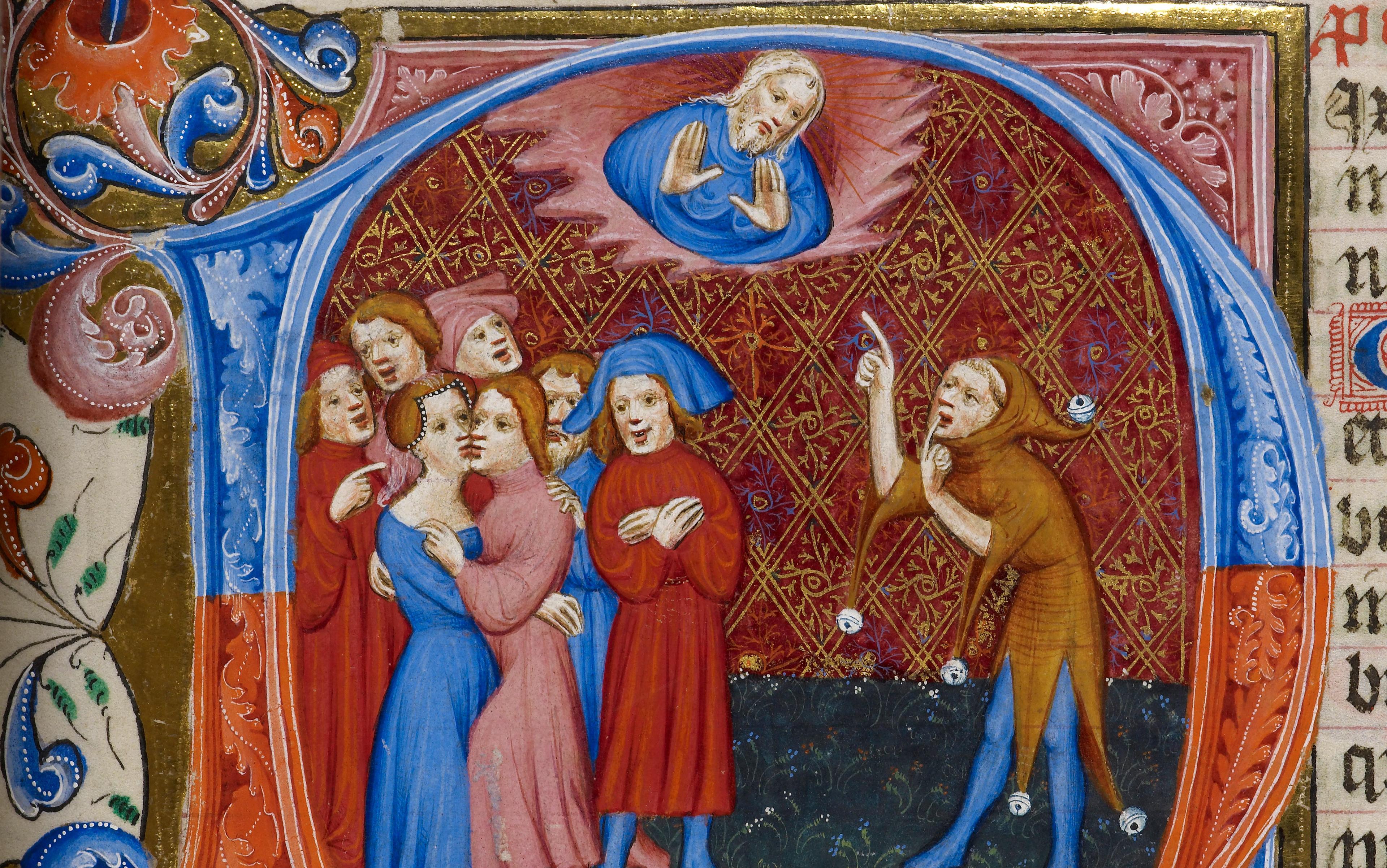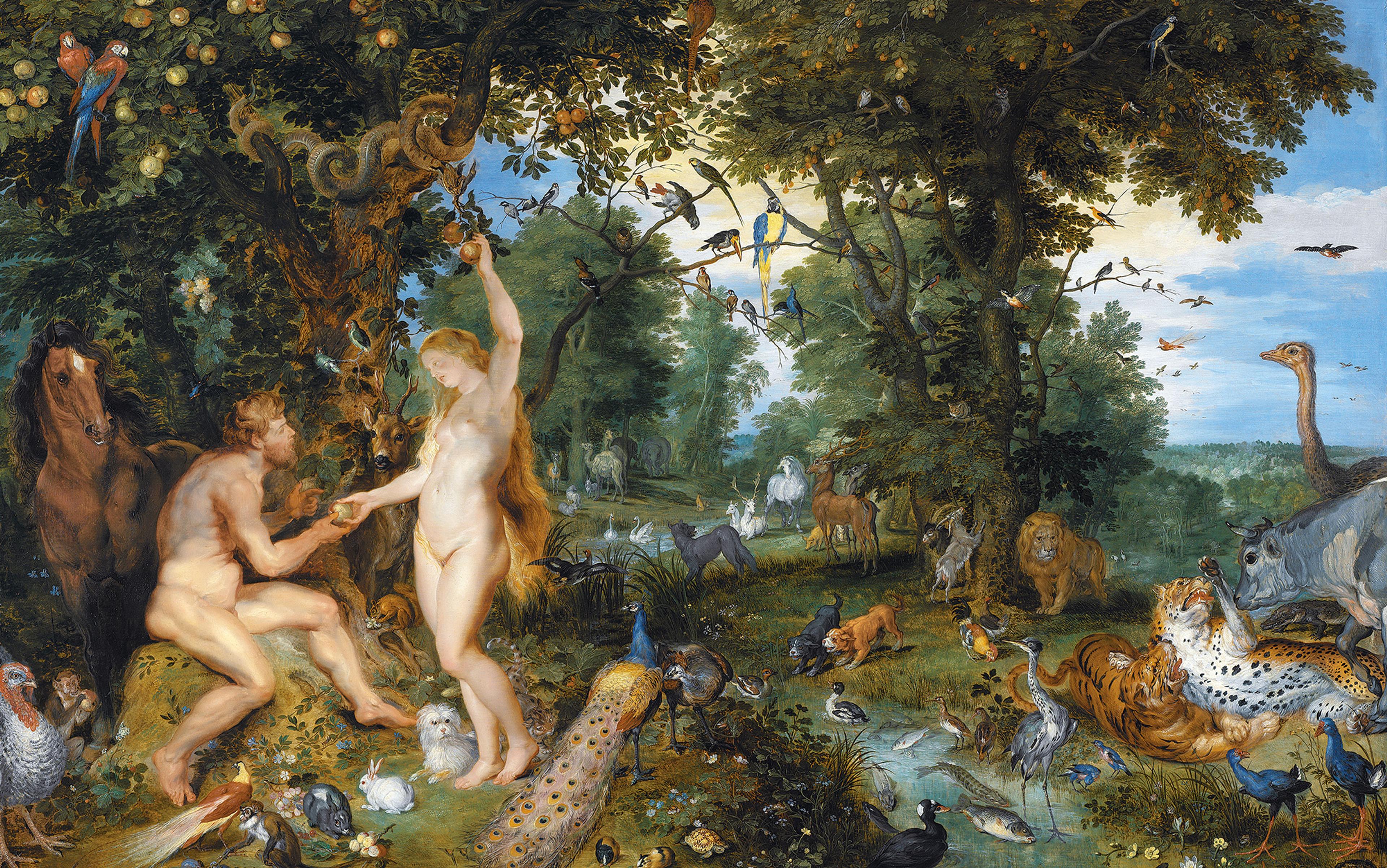Anyone who has ever read the Bible knows that God can speak. Over the course of six days, God speaks the world into existence and then speaks to both Adam and Eve in the Garden of Eden. Later he speaks to Cain and Abel, to Noah, to Abraham and many others. What sorts of things does God say? He issues commands – ‘Let there be light!’ – he lays down prohibitions – ‘Don’t eat from that tree!’ – and he asks questions, metes out punishments, offers advice, forecasts the weather, and orders an old man to kill his only son. Sometimes he says these things calmly, sometimes sarcastically, occasionally his words are filled with anger or pity or love. When God speaks people listen, but when people listen, should they always believe him? In other words, can God lie?
For over a millennium, some of the most influential theologians and philosophers debated the problem of divine deceit. Imagine that God can lie, asks the early fifth-century bishop Augustine. Imagine that God has decided to include falsehoods throughout the Bible. How would we know what parts to believe and what parts to reject? With the best of intentions, we might unknowingly condemn ourselves to eternal damnation, accepting heresies as truths, rejecting truths as heresies. The dangers of a deceiving God extended far beyond the pages of scripture. The 14th century Oxford-trained theologian John Wyclif feared that if God could lie to us, he could give us false visions, reduce reality to mere appearance and undermine all our knowledge of the world.
‘Can God lie?’ proved an important question for more than 1,000 years because it compelled theologians to consider in the starkest terms the nature of God’s relationship to the world. It led directly to the matter of God’s nature and essence. These are important questions, but they also proved difficult to answer because the evidence seemed to contradict itself. There were two distinct approaches to understanding God’s involvement with the world and they suggested very different conceptions about God.
On the one hand, people could look to the narrative of scripture for clues. Scripture reveals a God who acts and reacts to events in the world, who destroys cities, makes covenants, and speaks to Moses in the guise of a burning bush. On the other hand, people could think about God in more philosophically inflected terms, using ideas borrowed from Plato and Aristotle and other Greek thinkers, although these borrowings always had to be adapted to the demands of scripture. Omnipotent and perfect, this philosophically conceived God existed at a distance, aloof from his creation, unchanging and immutable. A perfect being, after all, lacks for nothing and, lacking nothing, never needs to do anything.
To be honest, no one – except the German reformer Martin Luther in his most religiously angst-ridden moments – ever asserted that God could lie. The debate centred around the question of whether God could deceive. The distinction between lies and deceptions was never entirely clear-cut. Theologians unanimously agreed with Augustine who had asserted: ‘A lie consists in speaking a falsehood with intention of deceiving.’ Theologians also agreed with Augustine that every lie is a sin and no good intentions can ever turn sinful actions into virtuous ones. ‘Is every lie a sin?’ the Dominican Sylvester Prierias would ask in the late 15th century: ‘I answer that it is not even licit to lie for the sake of saving someone’s life, as Augustine, St Thomas, and all the theologians and canon lawyers teach.’
Perhaps every lie was a sin, but there was also widespread belief that there was nothing wrong with dissimulating, misleading and concealing the truth when necessary. Murkiness confronted anyone who looked carefully into these terms. What is the difference between concealing and lying? A popular definition, already found in Thomas Aquinas and endlessly repeated throughout the Renaissance, distinguished between virtuous dissimulation and sinful simulation. We dissimulate when we conceal something about ourselves, we simulate when we pretend to be something we are not. Concise, yes, but was this distinction any distinction at all? As the Neapolitan bureaucrat Torquato Accetto would note in the 17th century, when we conceal something, don’t we necessarily pretend to be someone we aren’t, pretend to be the person who lacks a quality we actually possess?
But what about God? Citing the opening words to the Nicene Creed – ‘We believe in God the Father almighty’ – Augustine argues that God can neither deceive nor be deceived. ‘If God could lie or be deceived, if he could deceive or act in any sort of unkind way, God would not be omnipotent because this sort of behaviour is not worthy of an omnipotent being.’ Augustine adds that God cannot sin, cannot even wish to do evil things. Everything God does, God does well, and whatever God does well he does justly.
A host of medieval theologians would agree and, in the 17th century, the French philosopher and scientist René Descartes would add his assent. If God really is all-powerful, if God possesses all possible perfections, then it is impossible for God to be a deceiver. ‘For it is clear by the natural light,’ Descartes argues, ‘that all fraud and deception depend on some defect.’ Like Augustine, Descartes contends that deceptive, fraudulent and mendacious actions are utterly incompatible with an all-powerful being. A truly omnipotent being not only would never do such things, it would not even be capable of doing such things. God cannot lie or deceive, because God is God.
There was one problem with these philosophically-minded defences of God’s essentially honest and transparent nature: scripture suggested otherwise. Robert Holkot, a 14th century Dominican theologian, popular in his day, now unjustly neglected, suggested there were any number of places in the Bible where God deceived demons, sinners and even the faithful. He deceived Abraham, father of the Jewish people, when he ordered him to sacrifice his son Isaac, only to revoke that order at the last moment, as Abraham held the knife over his rope-bound and trembling son.
Two centuries later, John Calvin reached the same conclusion while reflecting on the passage in I Kings in which God ‘wills that the false king Ahab be deceived’, sending the Devil to fulfill this wish ‘with a definite command to be a lying spirit in the mouth of all the prophets’. For Calvin, this bit of scripture was particularly powerful. Ever since Augustine, theologians had sought to absolve God from whatever evil might be laid at his feet by invoking a distinction between what God wills and what God permits. God does not will evil things to happen, he merely allows them to happen. No good here, Calvin would retort, because scripture states that God does much more than merely allow the Devil to lie to Ahab. Chalk it up to God’s infinite and infinitely inscrutable nature, Calvin writes, a God who hates all liars, commands us never to lie, yet seems to lie all the same. God might well never lie, Calvin concludes with palpable frustration, but how this is so is forever beyond our comprehension.
much like the Devil, God makes a bad deal sound good as he tempts the Devil to crucify the innocent Jesus
Even those thinkers who asserted that God by definition could not deceive, that deception was incompatible with God’s divine perfection, found themselves compelled to admit that God does sometimes deceive. Historians often miss this sort of theological backpedalling because it almost always takes place off the philosophical stage, so to speak, not in theological treatises but in commentaries on the Bible, in sermons and in letters, especially when those commentaries, sermons and letters concern the life of Christ. Why, after all, did God need to send his only son to redeem mankind? And why did Christ conceal his divinity, appearing on Earth not as God, but as the man Jesus?
Pondering the Gospel narratives, Gregory of Nyssa – Augustine’s slightly older peer – suggested that we read Christ’s life as something like a 33-year ruse. The Devil had deceived Adam and Eve into disobeying God’s command not to eat from the Tree of the Knowledge of Good and Evil. Making a bad deal seem good, he promised them that contrary to what God had told them, they would not die if they ate the fruit, that they would be like God himself. Deceived, they ate, and in eating they became Satan’s slaves, subject to death and disease, pain and suffering.
To undo this tangle of despair, Gregory argues, God decided it would be best to deal with the Devil much as the Devil had dealt with Adam and Eve. The Devil had disguised himself as a serpent, so God disguises himself as a sinless man, the only sinless man in the world, a man whose virtuous purity is worth more than every other sinful person combined. And so, much like the Devil, God makes a bad deal sound good as he tempts the Devil to overreach, to crucify the innocent Jesus and, in so doing, to lose his grip on all of humanity.
Of course, the Devil would act in so foolhardy a fashion only if he failed to recognise that Jesus is Christ. ‘It was beyond the Devil’s power,’ Gregory writes, ‘to look upon the unveiled appearance of God, he would see only in Christ a part of the fleshly nature which he had of old subdued through wickedness.’ Gregory summarised this divine plot in a striking metaphor: ‘The divine nature was concealed under the veil of our human nature so that, as with a greedy fish, the hook of divinity might be swallowed along with the bait of flesh.’
It was an odd state of affairs, one that was never fully resolved. Human salvation seemed to depend on the deceptions of a God who couldn’t deceive. Augustine would swap out Gregory’s image of divinely baited hooks for the image of a mousetrap – ‘The Lord’s cross was the devil’s mousetrap: the bait which caught him was the death of the Lord Christ’ – but the end result was the same.
Subsequent theologians would add layers of nuance to this devious divine plot. In the 13th century, Thomas Aquinas asked why Jesus’s virgin mother needed to marry. He offers up a variety of reasons – boys need father figures and turn-of-the-millennium Jews would not have looked too favourably on an unwed mother. Citing the church father Ignatius, Thomas adds another more surreptitious reason, arguing that Joseph, Mary’s husband, was a decoy, a beard, employed so ‘that the manner of our Lord’s birth might be hidden from the devil’. Eventually, Thomas contends, the Devil and his minions would know full well just who and what Christ was, but during his infancy and childhood, ‘it behooved the malice of the devil to be withheld, lest he should persecute Him too severely: for Christ did not wish to suffer such things then, nor to make His power known, but to show himself to be in all things like other infants.’
Theologians looked to ideas from the Roman writer Cicero’s rhetoric to distinguish God’s divine dissimulations from the Devil’s serpentine simulations. The 13th century Franciscan theologian Bonaventure argued that the Devil was like an evil and cunning sophist, Christ a virtuous and prudent orator. The difference had everything to do with fit and intention. The morally upright orator fits himself perfectly to the circumstances at hand, adapting his words and deeds, his gestures and expressions, to the demands of the moment. He takes into account his nature and that of the audience, his goals and the obstacles before him. The sophist, by contrast, uses corrupt and ill-fitting means to achieve equally corrupt and ill-fitting ends.
No one doubted that Christ’s actions, disguises and misleadingly deceptive words were perfectly upright, perfectly prudent and just, even if it proved easier to assert this righteousness than to explain it. Successful or not, transforming God into the perfect rhetorician, the perfect orator, heightened the tensions between the two ways of conceiving God. Rhetoric, after all, is the art of adapting oneself to the moment; it requires adjustments and reactions, a constant recalibrating of our interactions with others. It was precisely this need to adapt, to change, to act and react, to speak and deceive, that seemed so foreign to the philosophical conception of God as eternal, perfect and unchanging.
As it turned out, miraculous interference proved hard to distinguish from deception
At the turn of the 14th century, another source of tension between scripture and philosophy made the threat of divine deception more pronounced. Aristotle’s writings, most of which had been lost to Europeans for centuries, had started to become available during the 12th century. Intellectuals, keen for the newest thing, incorporated Aristotle’s works into the curriculum of the various medieval universities and Aristotle’s ideas honed the cutting edge of 13th century intellectual life. But Aristotelian philosophy often cut across scripture, not with it.
According to Aristotle, God – the ‘Unmoved Mover’ – was part of the universe, the best part, but still part of it, giving it form and energy according to the necessary and unchangeable dictates of reason itself. Theologians could hardly sit by idly as students and teachers absorbed this deflated image of God. If scripture taught anything about God, it taught that God transcended a universe that he had created ex nihilo, out of nothing. God is omnipotent, they asserted, he can do anything.
Demonstrating God’s omnipotence required theologians to describe all the ways that God could miraculously interfere with the ordinary course of nature. As it turned out, miraculous interference proved hard to distinguish from deception. Early in the 14th century, William of Ockham, known to posterity for his razor, asked his readers to carry out a simple thought experiment. Imagine you are looking at a star. Now, imagine that God, who can do anything, destroys the star while maintaining your vision of it. What you now see is a non-existent star.
From theological thought experiments to the daily life of the Church, the possibility of divine deception seemed to crop up everywhere. Robert Holkot asked his readers to think about the celebration of the Eucharist. At the moment of consecration, God miraculously transforms a piece of bread that never ceases to look like anything but a piece of bread into the very body of Christ. For these Christian thinkers committed to limiting the implications of Aristotle’s philosophy, God’s omnipotence required that he be able to deceive.
Far from being a mere curiosity of the past, concerns about God’s deceptions proved central to the Scientific Revolution and therefore to the modern world. Most of the great 17th century scientists (or natural philosophers, as they would have preferred to call themselves) – Kepler and Galileo, Descartes, Boyle and Newton – wrote about God and incorporated God into their theories, not as a mere concession to authorities, but as central to their conceptions of the universe.
Descartes, knowingly or not following in Ockham’s footsteps, raises the possibility that God (or at least an ‘evil genius’) has deceived him about the existence of the entire universe and everything in it. Although Descartes would quickly dismiss these fears, arguing that it would go against God’s very nature to deceive, some of his readers couldn’t help but point out that there are passages in the Bible in which God certainly seems to deceive.
God became the source of universal order at the cost of no longer having anything much to do with the universe
Descartes responds (as others had before him) that we must read these passages allegorically. The Bible was written for a simpler people incapable of understanding God’s true and truly abstract nature. When the Bible tells us that God is angry or sad, that he lies and deceives, we can be sure he did nothing of the sort. Scripture, so the saying goes, speaks the language of man. The early Enlightenment writer Pierre Bayle, less restrained than Descartes, summarised the principle this way: ‘Vulgar minds being not able to raise themselves to the most perfect being, it was necessary that the prophets should bring God down to man, and make him stammer with us, as a nurse stammers with a child whom she suckles.’
How do we read cases of divine deception properly?
Descartes considers a case of possible divine deception taken from life – the case of a man with dropsy, a condition in which his body retains dangerous amounts of water, even as he remains thirsty. From the man’s perspective, it certainly seems like God deceives him in the very organisation of his body. He is thirsty, but if drinks, he will drown. Descartes maintains that thinking about the problem this way misleads to imagine God in simplistic and anthropomorphised terms, as if he were involved with the world, intentionally deceiving this suffering man while leaving all the rest of us alone.
A simplistic, anthropomorphic God is ridiculous, Descartes argues. Rather we must ask how God created the world so that while it may appear as if he occasionally deceives us we know in fact he does nothing of the sort. If God is omnipotent, just and wise, Descartes reasons, it must follow that God created the best possible world, using the simplest set of laws. The simplicity of the laws governing the world must be consistent with God’s simple nature, while their complex yet well-structured consequences derived from his all-seeing wisdom and justness. Consider how well creation operates – when we are thirsty, it is almost always the case that we really do need water.
For all their success, the simplicity of these laws guarantees that occasionally some breakdown will occur. During these infrequent moments, God could intervene, cluttering up his general laws with various exceptions. He could do this, but he doesn’t. Writing later in the century, Nicolas Malebranche, summarising Descartes’s insight, would explain: ‘These laws, on account of their simplicity, necessarily have unhappy consequences for us, but these consequences do not warrant that God change these laws into more composite ones. For his laws have a greater proportion of wisdom and fecundity to the work they produce than all others which he could establish for the same design.’
Put more simply, the commitment of the Scientific Revolution to rational causes for all events, even exceptional or seemingly anomalous ones, robbed God of the power to deceive. Losing the power to deceive, God lost the power to speak, to interfere and interact with the world. From the perspective of scientists this was almost necessary, interested as they were in a stable and constant world reducible to mathematical equations and inviolable principles. God became the source of universal order at the cost of no longer having anything much to do with the universe.
This change brought real consequences. More and more, scientists came to imagine the entire universe as a vast machine, a complex mechanism akin to a clock. God, having designed and created it, wound it up, then stepped back and let it run its course. What greater proof of God’s existence, majesty and power could there be than the intricate operations of a nature so seemingly organised for the benefit of human kind? William Paley asked readers of his Natural Theology (1802) to imagine finding a watch on a forest path, and then to step back and consider the wonderfully complex watch-like workings of the world. Surely such a world could only be the product of an infinitely wise, powerful and good creator? Machines require machinists, order requires an orderer, and the world requires God.
The next chapter in this story – the chapter in which we live – starts with Darwin and natural selection, and continues with evangelical and fundamentalist Christians rejecting the truths of science and calling for a return to the literal truths of scripture. If science and religion are not at war with each other today, they certainly seem incompatible. This incompatibility has much to do with how, for centuries, God could deceive and then, one day, he couldn’t.
Seventeenth century natural philosophers needed to prohibit the very possibility of divine deception and this prohibition is a forgotten source of the gap that today exists between science and religion. They all believed that God was both their salvation and the master craftsman of the amazing cosmos. Beyond that, they needed God to be silent because only in silence could they find the truths they sought. Finding those truths, it became necessary to believe there had never been anything else but silence.
The Devil Wins: A History of Lying from the Garden of Eden to the Enlightenment (2015) by Dallas G Denery II is published via Princeton University Press.






